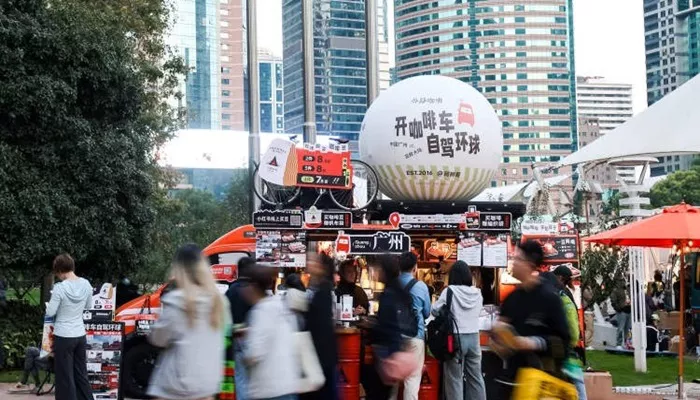Shanghai maintains its status as the leading city in China’s burgeoning coffee market, boasting 9,553 coffee shops, officials revealed at the opening of the Lujiazui Coffee Festival on Wednesday in Pudong New Area.
Jin Wencheng, director of the Ministry of Agriculture and Rural Affairs’ Rural Economy Research Center, unveiled the Global Coffee Industry Development Trends Insight Report during the event. The report highlights that China’s annual coffee consumption reached 280,000 metric tons last year, with around 157,000 coffee shops serving a growing clientele.
The report, a collaboration between the China Media Group Shanghai Bureau and the research center, noted that the value of China’s coffee industry surged to 265.4 billion yuan ($37.3 billion) in 2023, marking an increase of over 30 percent from the previous year. Nearly 400 million consumers in the country now engage with the coffee sector.
“The Chinese coffee market has experienced remarkable growth, positioning itself as a leader in the global coffee industry,” Jin stated. He emphasized that the report assesses the industry through three critical dimensions: scale, development quality, and resilience.
According to the findings, coffee production in China rose from 114,000 tons in 2020 to 146,000 tons last year, with Yunnan province contributing 98 percent of the nation’s output, solidifying its status as the primary coffee-producing region.
Jin noted that the refinement and branding of coffee products are pivotal to the high-quality development of the domestic industry, with the share of premium domestic coffee now at 22.7 percent.
“Emerging domestic coffee brands are thriving, and the integration of coffee culture with tourism is becoming a novel business model,” he added.
Globally, coffee production is recovering, with the report indicating that worldwide coffee consumption reached 10.62 million tons last year, a 2.2 percent increase from the previous year, corresponding to a total daily consumption of 3 billion cups.
In addition to China, countries such as Brazil, the Philippines, and South Korea are also witnessing rapid growth in coffee consumption.
The bustling crowd at the Lujiazui Coffee Festival, the venue for the news conference, reflects the vibrant coffee culture in Shanghai, which has the highest number of coffee shops in China. The festival, now in its ninth edition, runs until October 27.
Taking place at Shanghai’s Lujiazui Central Greenland, the festival features over 260 selected brands, more than 100 boutique coffee shops, and over 20 industry influencers from more than 70 cities worldwide. It serves as a creative platform for exchanging ideas and showcasing the latest coffee products.
International specialty coffee brands, including Manhattan Coffee Roasters from Rotterdam, Ghostbird Coffee Roastery from Kuala Lumpur, and Proud Mary Coffee Roasters from Melbourne, are among the 12 newcomers making their domestic debuts at the festival.
Since its inception in 2016, the Lujiazui Coffee Festival has become a cultural cornerstone in China’s coffee industry, attracting over 850,000 participants to date.
“With the growing brand influence of the Lujiazui Coffee Festival, we aim to not only introduce more global coffee flavors to Pudong but also explore new avenues for Chinese coffee to penetrate the international market,” said Chen Bai, director of the festival.
Related Topics:
Coffee Under Threat: G7’s Bold Plan Aims for Sustainable Supply Chain
Taste Italy in Waco: Azzurro Café Opens Its Doors
Grounds Coffee Co. Brews Up Business with Viral TikTok


